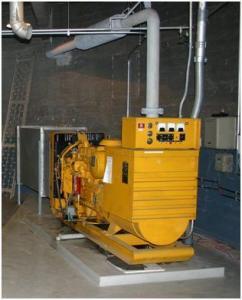Seeking the Right Generator

[February 2021] The recent ice and snow in Texas caused major power outages for days. Many companies have decided to acquire some backup generators in case it happens again. Choosing the right generator takes time and research. Perhaps a good place to start is what kind of power you need – and what you get.
Having just survived 60 hours of power outage, I got to know my generator very well.
For broadcasters, not only does having backup power to stay on the air through harsh circumstances keep the revenue flow intact, it also keeps the listener from punching the button to a competitor, who might just siphon off some loyalty.
If the generator you are using or planning to install has handles and a set of wheels – and does not have the words Onan or Kohler on it – it likely is not a good choice for anything but the most dirty-power-tolerant loads (even some of the larger Hondas fall into this category). It can only run precision loads (i.e., computers, TVs, or communication gear) if the output is first filtered through a UPS which can handle the Voltage, and then generate clean power from the batteries.
GET THE RIGHT ONE
I am a reseller/installer of gently used gensets from decommissioned cell/microwave sites, so I have seen and worked on many of the genera-tors on the market.
If the unit is not one of the major names (Onan, Kohler, Cat/Olympian, Baldor, or Multiquip) then it is likely of Chinese or other foreign heritage. If so, it usually is a hopeful assumption it will make rated power, and that for an extended time (several days), creating a clean sine wave of proper Voltage, current, and phase.
The home power, permanently-installed units (Generac, Champion, Briggs & Stratton), are much better, but some may still have less than perfect generation and require the UPS interface to supply precision loads. These are affordable and generally suited for smaller transmitter sites (</= 5 kW) but should first be evaluated on a test load to determine if they are clean enough before purchase/installation (usually they are).
Anything larger should be restricted to models from the major manufacturers, or you may be asking for trouble.
TEST IT REGULARLY
The amount of testing that should be done varies with locality and climate.
In the frozen North at minimum a weekly exercise is necessary, as well as the use of engine heaters or any additional heating systems necessary to care for critical fuel systems that must be ready to flow under any conditions – and which conditions generally end up being the worst possible.

Warmer Southern climes can usually get away with testing every two weeks, but that should probably upped to weekly during the winter months. And even in Texas, as we are experiencing as this is written, engine heaters really are a necessity.
Regular generator maintenance should be per-formed monthly, with maintenance and full load testing from professional service companies at least one or twice a year.
And, do not forget to ensure the battery is ready to perform!
MANAGEMENT CONCERNS
The question for management should be whether being off the air for several hours to days is a tolerable expense, or if the loss of revenue is significant enough to justify the minor expense of purchase and maintenance.
This is generally commensurate with market ranking, as the dollars involved are usually greater in Buffalo than Bug Tussle.
The greatest impediment, however, is always management and their vision, or lack thereof. If carefully studied and frugally but intelligently purchased, rarely is a generator more costly than it is worth. Any station not on the air has no revenue.
On the other hand, a station having the backup power to stay on the air does not lose critical revenue nor listeners who could end up jumping over to a competitor who stays on.
What is that result ultimately worth to your station’s Owner/General Manager?
– – –
Mike Vanhooser is the owner of Nova Electronics in Dallas, TX, and has been actively providing broadcast engineering solutions for many stations. You can contact Mike at:
novaelec@sbcglobal.net
– – –
Did you find this article helpful? Would you like to know when more articles like this are posted?

